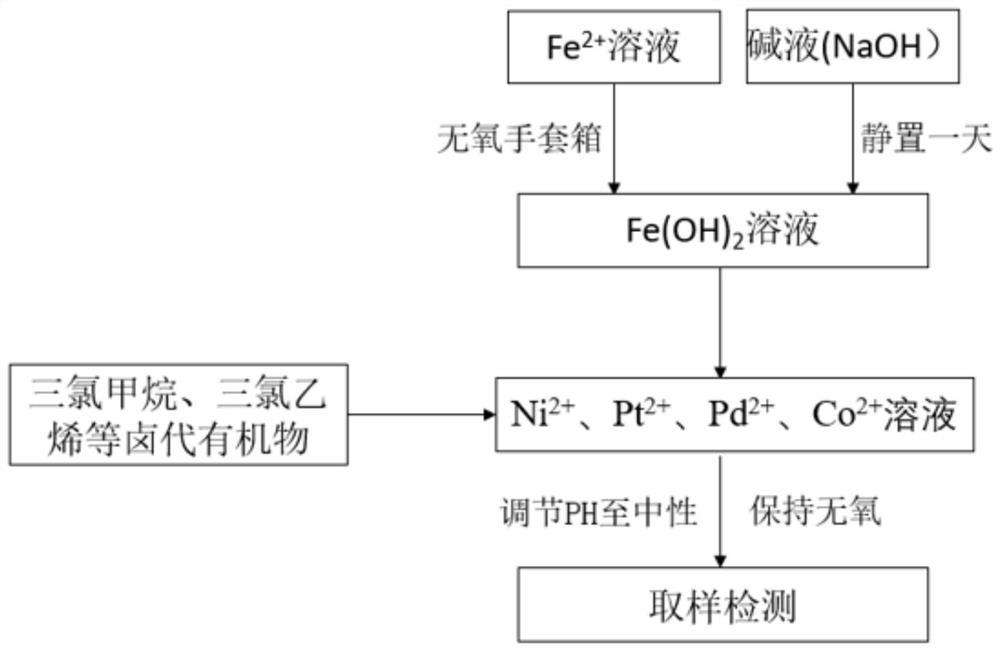A method of doping fe(oh) with metal ions 2 Method for Removing Halogenated Organic Pollutants in Water
A technology of organic pollutants and metal ions, applied in the direction of water pollutants, contaminated groundwater/leachate treatment, chemical instruments and methods, etc., can solve the problems of high cost and stability to be improved, and achieve cost saving and reduction The risk of secondary pollution, the effect of easy realization
- Summary
- Abstract
- Description
- Claims
- Application Information
AI Technical Summary
Problems solved by technology
Method used
Image
Examples
Embodiment 1
[0041] In this embodiment, a Ni 2+ Doped with Fe(OH) 2 The method for removing HOCs in water bodies is to treat water polluted with trichlorethylene, and the concentration of trichlorethylene is 20 μM, comprising the following steps:
[0042] Preparation of Fe in an anaerobic glove box 2+ solution and lye (NaOH), and Fe 2+ The solution is slowly added dropwise to the lye, and after the dropwise addition is completed, the Fe(OH) 2 Reserve solution for one day, reserve, the concentration of Fe(II) in the reserve solution is not lower than 450 mM, pH > 13;
[0043] Preparation of Ni in an anaerobic glove box 2+ Solution, when the concentration of the metal ion solution is 100 mM, set aside;
[0044] A 10 mL transparent glass bottle was used as the reaction system (the working system was 5 mL), and 0.5 mL Fe(OH) was added to the reaction system 2 stock solution, then add 0.5 mL Ni 2+ Shake the solution for 30 seconds, add anaerobic water to make it to 5 mL, adjust the pH to...
Embodiment 2
[0047] This embodiment is basically the same as Embodiment 1, especially in that:
[0048] In this example, a Co 2+ Doped with Fe(OH) 2 The method for removing water body HOCs is to treat water containing carbon tetrachloride pollution, and the concentration of carbon tetrachloride is 20 μM, comprising the following steps:
[0049] Preparation of Fe in an anaerobic glove box 2+ solution and lye (NaOH), and Fe 2+ The solution is slowly added dropwise to the lye, and after the dropwise addition is completed, the Fe(OH) 2 Reserve solution for one day, reserve, the concentration of Fe(II) in the reserve solution is not lower than 450 mM, pH > 13;
[0050] Preparation of Co in an anaerobic glove box 2+ Solution, when the concentration of the metal ion solution is 100 mM, set aside;
[0051] A 10 mL transparent glass bottle was used as the reaction system (the working system was 5 mL), and 0.5 mL Fe(OH) was added to the reaction system 2 stock solution, then add 0.5 mLCo 2+ ...
Embodiment 3
[0054] This embodiment is basically the same as the previous embodiment, and the special features are:
[0055] In this example, a Pd 2+ Doped with Fe(OH) 2 The method for removing HOCs in water bodies is to treat water polluted with trichlorethylene, and the concentration of trichlorethylene is 20 μM, comprising the following steps:
[0056] Preparation of Fe in an anaerobic glove box 2+ solution and lye (NaOH), and Fe 2+ The solution is slowly added dropwise to the lye, and after the dropwise addition is completed, the Fe(OH) 2 Reserve solution for one day, reserve, the concentration of Fe(II) in the reserve solution is not lower than 450 mM, pH > 13;
[0057] Preparation of Pd in an anaerobic glove box 2+ Solution, when the concentration of the metal ion solution is 100 mM, set aside;
[0058] A 10 mL transparent glass bottle was used as the reaction system (the working system was 5 mL), and 0.5 mL Fe(OH) was added to the reaction system 2 stock solution, then add ...
PUM
 Login to View More
Login to View More Abstract
Description
Claims
Application Information
 Login to View More
Login to View More - R&D
- Intellectual Property
- Life Sciences
- Materials
- Tech Scout
- Unparalleled Data Quality
- Higher Quality Content
- 60% Fewer Hallucinations
Browse by: Latest US Patents, China's latest patents, Technical Efficacy Thesaurus, Application Domain, Technology Topic, Popular Technical Reports.
© 2025 PatSnap. All rights reserved.Legal|Privacy policy|Modern Slavery Act Transparency Statement|Sitemap|About US| Contact US: help@patsnap.com

